What’s the fastest way to become a millionaire? Start as a billionaire goes the joke only plenty won’t be laughing right now as stockmarkets and commodity prices crash. Several high profile team owners have seen their fortunes descend faster than Peter Sagan off the Rochette. In the first of a two-part series looking at the wealthy backers of the sport here are the billionaire and millionaire World Tour team owners and sponsors.
Think wealthy cycling tycoons and Oleg Tinkov probably comes to mind. He has announced he’ll leave the sport but there’s still a year to go for him and his Tinkoff team, let’s hope he bought the Euros as the Rouble has just hit an all time low against the European currency making it more expensive than ever to pay Peter Sagan’s salary. As for Tinkov, he’s joined the millionaire’s club, normally something many would celebrate only for Tinkov it’s bad news as he used to be a billionaire. The serial entrepreneur – he is not an oligarch – has seen his latest venture, Tinkoff Bank, hit hard by the Russian rouble crisis as interest rates soared, think of it as a rise in the price of raw materials for a credit card business. Now the cratered oil price means a further shock to the Russian economy which can’t help consumer credit although Tinkoff Bank’s stock price has stopped its slide meaning Tinkov’s net wealth hasn’t changed too dramatically of late. All this backstory is irrelevant if he’s going but it could be part of the reason why he’s leaving too.
Another Russian who is mulling an exit is the discreet Igor Makarov, the owner of the Katusha team. Not for him provocative tweets and a team in his name, he’s discreet to the point where photos are hard to come by. Still he buys superyachts like you might buy bikes or cars. Now you can use a Tinkoff credit card but you cannot buy a Katusha, here is a team that has no naming rights sponsorship deal, instead it’s funded by Makarov with help from various related sponsors, such as the Itera group, the gas trading company founded by Makarov which he sold to Russian oil and gas giant Rosneft for $2.9 billion (€2.1bn), all at time when the oil price was north of $100. He got out when the going was good but remains connected to the Itera group. Itera spelt backward is Areti, sponsor of the Gazprom-Rusvelo team. Makarov could stop funding teams but may stay on in other roles. He chairs the Russian federation and sits on the UCI’s Management Committee and his Itera group also funds the European Cycling Union and he played a pivotal role in Pat McQuaid’s ejection from the UCI. If you want more on his story, see Tinker, Tailor, Cyclist, Spy.
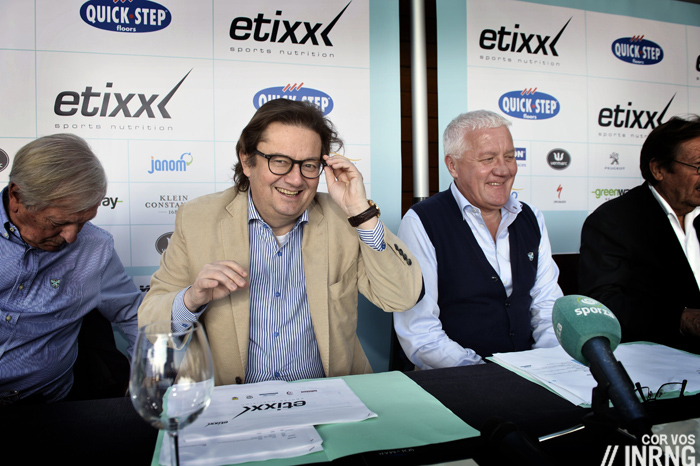
Continuing the theme of billionaires leaving is Belgium’s Marc Coucke, a practitioner of the “buy low, sell high” mantra. He founded Omega Pharma which makes medical supplies like bandages and other health paraphernalia. He became a millionaire when his firm floated on the Belgian stock exchange and when the stockmarkets tumbled he bought it back cheap and waited for stockmarket values to rise whereupon he floated it again. Then he sold the firm to US business Perrigo, reportedly pocketing €1.45 billion, tax free. Apparently there’s a clause in the takeover deal saying Perrigo has to keep funding the team for a couple more years. Coucke still follows cycling and did his “Couckenbak” song – a thing in Belgium – during the Tour de France but has gone football crazy. He bought into KV Oostende, a Belgian soccer club and LOSC, a French Ligue 1 team and a glance at his Twitter timeline shows endless football fandom.
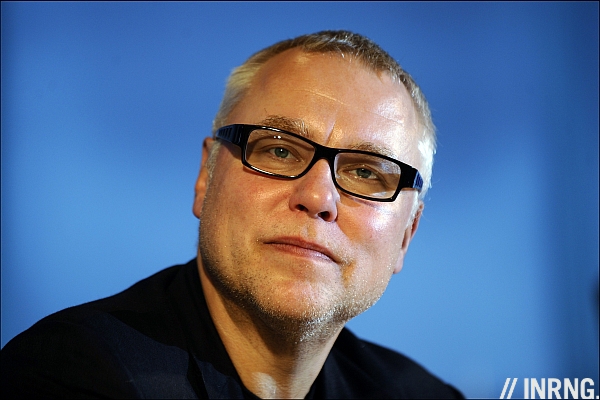
Now for the billionaire cycling team owner of which little is known. If Coucke has sponsored the OPQS team for years, Zdeněk Bakala is the one who owns it. The Czech billionaire bought the team with Dutch sidekick Bessel Kok and is a textbook capitalist who left his country with little more than a sandwich in his pocket for the USA. He went to business school then investment banking on Wall Street until the Iron Curtain fell and he opened the offices of an investment bank in Prague before going solo. According to Business New Europe, a magazine, he bought a coal mining business for €400 million, sold some its assets for €2.5 billion and then floated the remaining business on the stock market for €4.5 billion. Among other things he owns a large stake iron ore producer Ferrexpo and mining firm called New World Resources, both of which have a stock price chart that looks like the profile of a downhill time trial. Iron ore prices have collapsed given crashing steel production and if you think that’s a headache, Ferrexpo has most of its operations in Ukraine. It’s is just one part of his portfolio but indicative of Bakala’s falling wealth which, going by the guestimation of Forbes, almost halved in 2014 and now he’s a “drop off” the billionaires list, a broom wagon waiting to sweep him up. Still he remains prodigiously wealthy and is part of the Czech establishment. If he wants to drown his sorrows he owns the scenic Klein Constantia vineyard in South Africa which explains why this sponsors the Etixx-Quickstep U23 team. Bakala did get excited about the reform of the sport a while back with proposals for a total overhaul of the sport, a joint venture with the UCI where the governing body would set the rules and calendar… and Bakala would take care of the rest, funding a breakaway league in conjunction with the modestly-named Gifted Group. Has this gone away or has Bakala’s idea been rebranded as Velon? He’s a figure in Czech politics because of his wealth and influence and media empire but lives in Geneva and is a keen cyclist who’ll ride the Cape Argus in South Africa when he’s visiting the winery.
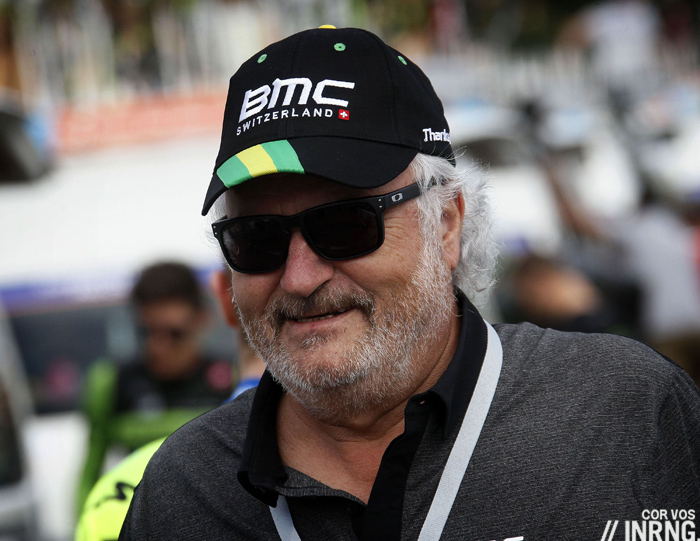
Andy Rihs of BMC Racing is a more discreet figure. His father Ernst started a hearing aid business that went from the garage to a global consumer healthcare giant called Sonova and at the time of writing it is worth about US$7.7 billion. Rihs’s remaining 5% stake means a holding valued around $380 million. But he’s worth much more as he owns BMC and has financial stakes in wineries, hotels and watch making, normal since the BMC factory in Grenchen is near the Breitling HQ in an area famous for its luxury timepieces. He’s obviously cycling-crazy, the budget for BMC Racing is greater than the profits of the BMC bicycle company meaning the team is a personal investment. Rihs isn’t in the media a lot nor tweeting like songbird but can often be spotted at the races and ready for a chat on wine or racing. He’d been thinking of an exit from the sport but has announced he’ll stay on and fund the team until 2018.

Another Swiss figure who funds a team but is considering an exit is Michel Thétaz. He founded Independent Asset Management in 1995. Better known as IAM, it manages billions of Swiss Francs on behalf of its clients out of Geneva in Switzerland. Estimates of his wealth are hard to come, but in dollar terms think hundreds of millions. He’s a keen cyclist but this only part-explains the sponsorship. Cycling’s demographic attracts lotteries, laminate flooring and car brands like Skoda so fund manager like IAM looks out of place. More so if you look at it the other way around, Swiss financial firms typically sponsor polo, yachting or show jumping. Thétaz prides himself on IAM’s independent thinking and doing things that others don’t. But the team has to find a new sponsor or at least a co-sponsor to stay on the road.

Is the co-sponsor ever going to come? Orica-Greenedge is Aussie for Orica-Your Name Here but it’s not proving easy to get that co-sponsor and it can’t be cheap with the contracts for the Yates Brothers and Esteban Chaves coming up, and that’s before the team tries to lock in Caleb Ewan. Sports fan Gerry Ryan (pictured right) can afford to bankroll the team for years, reports say he’s worth AU$340 million (US$280 million). The only worry is for his son as he once quipped it was his inheritance that was being spent. Ryan started out building camper vans and caravans in 1975 and Jayco has been a big success going from eight employees to – as the auto industry pulls out of Australia – what can be counted as Australia’s biggest vehicle manufacturer. But there are only so many caravans to sell and he’s become super rich with the Walking With Dinosaurs show to which he owns the rights, and his media and entertainment business also stages other shows. There’s more business and he’s been a generous donor to other sports too as well as owning race horses.
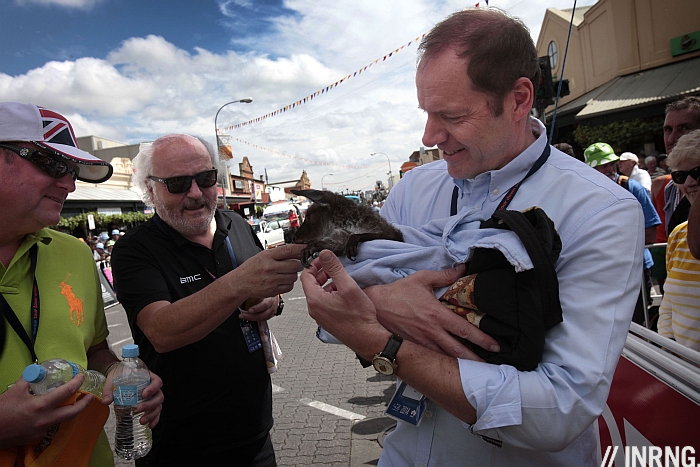
Conclusion
The point of this isn’t to gawk at wealth, it’s more to briefly explore the owners of the big teams, their motivations and connections. Each story is different but there are are three themes above:
- A lot of the World Tour teams are bankrolled by a billionaire shareholder, a sugardaddy who spends millions in the way you might allocate Velogames fantasy cycling credits
- Another theme is dwindling wealth, whether it’s the falling oil price, stockmarket upheavals or the nexus of these two events, the reported wealth of several team owners above has taken a bath although of course several names above got rich on the back of the rising prices
- No new names: year after year we’re seeing the same wealthy man and they’re starting to say out loud they’ve spent enough and shuffling to the exit
- They might be billionaires and millionaires but many are along for the ride, rediscovering childhood interest in cycling or zealous Mamils. That rider you see in team kit on a replica bike could be fan but they might just be a billionaire team owner
This is just the wealthiest World Tour team owners and major sponsors. Part II looks at others from sponsors to race owners and more.

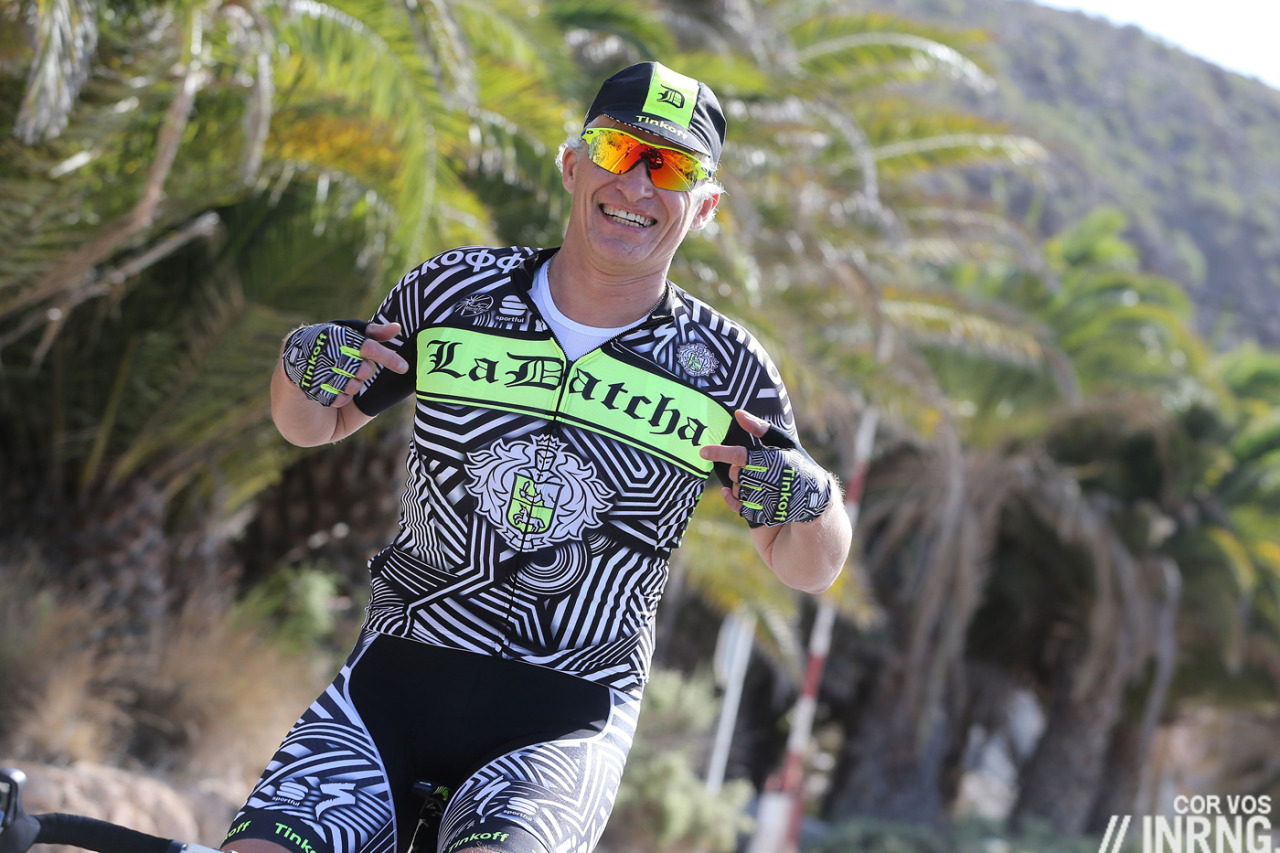
I find these stories about grotesque wealth a bit off putting. One thing of note, will Katusha drop out and be replaced by Gazprom-Rusvelo? It sounds like a possibility to me. Got to love those red and white Colnagos they ride, regardless of whatever else you think.
Like it or not these are the people that pay for a lot of the peloton and have a some influence on how the sport is run.
Is it better they spend their millions in cycling than on oil paintings? Or does this just bid up wages and make the sport too expensive for other sponsors?
Agreed with Inrng – some people might find it off-putting, but without these men, we wouldn’t have a sport to watch. These guys “invest in” / “sponsor” our sport purely because they love cycling, not because they have any notions of getting anything out of it.
To Inrng’s question, I’d argue the following:
1. Wages: There’s two parts to this aspect. First of all, average wages are stable purely because wealthy team owners have provided some predictable financial backing. Secondly, the one downside is that these wealthy team owners have significantly increased the highest salaries. Please note however, that the first aspect’s positives far outweigh the second. Without this wage stability, the majority of World Tour riders would be making much less than they do.
2. Overall stability: Without the willingness of these owners to continue supporting (let’s forget the word “sponsor” or “investment”, because that doesn’t really reflect the reality of these financial arrangements) cycling, there would be even more team exits at the top level.
Hey, sounds like we’re debating the stability of our sport again! Sounds like a familiar theme.
Inrng – thanks for this article, it’s interesting to read about the background to our favourite teams, and I’m really looking forward to part 2!
‘without these men, we wouldn’t have a sport to watch’ – yes, we would. It would be different, but it wouldn’t disappear.
I certainly find the individuals distasteful, at best – you wonder how many people some of them might have harmed to get what they have (or the environment in Orica’s case by some accounts), not to mention the fact that they could help an awful lot of people with this vast wealth, rather than keeping it for themselves.
How do they sleep at night? To quote ‘The Simpsons’, on a bed of money.
I would imagine they sleep just as well as you. Using your brain and your effort to create wealth that you then give to others is just the same as training hard to be a successful cyclist.
Yes and no corruption/illegal activity involved whatsoever – for example, in Makarov’s or Tinkov’s acquiring of roubles.
Ok, we would have a sport to watch, but yes, it would be very different. The point is, these particular sugar daddies only represent a portion of the overall sugar daddies that are funding cycling.
Let’s continue Inrng’s argument. Without sugar daddies, this is what would happen:
BMC would be gone, their riders dispersed elsewhere, similarly with Katusha, Astana and Tinkoff. Next, without Garmin and Sky’s sugar daddies (I’m assuming Inrng will discuss them next), they’d be gone. There goes the richest 6-teams. This is just an example. Pretty much every team only exists because of similar sugar daddies.
Our sport depends on donors… it’s a charity, a hobby. For the most part that is all it is.
The present situation isn’t at all the only way the sport can work. Regarding sponsorship, it has been working in the past under very different conditions (both different to present state of things *and* between themselves), through several decades.
Not sure about the wage thing you suggested above. A lot of WT riders are there on minimum wage, that is, their wage simply can’t go below that. Currently, there’s a huge pyramidal inequality in WT riders’ wages, I suppose that without sugar-daddies it would be “compressed” and the cost of having a top rider would become more affordable – that might give place to a different model, more accessible for small/medium companies, which could correspond to the ones most interested in cycling, that is, “new” companies (cycling is great to “make a name”, less so to work on a “winning”, “supremacy” image, which is the image most big companies want for themselves).
Several medium companies would be interested in cycling both in Italy and in Spain, but it’s just too expensive for them to arrive at the level of financial compromise you now need to receive proper exposure.
A serious analysis is needed here, but we shouldn’t forget that in any complex environment… more money might mean less money. Is it better 6 bringing in, say, 100 $ and 12 bringing in 10 $ (since the big six don’t leave you anything worth more than 10 $), or 18 bringing in 50 $ each? The six have an interest to implement the first system (pay the double, have about three times the winning options you’d have otherwise), and if no one stops them, they’ll just throw the money in and it will *naturally* happen. The interest of the global economic environment would favour more money being injected and more competition being possible, that is the second system. These are gross simplifications, obviously enough, still less gross than ignoring such factors.
This is a fair point, and I take JE’s point that the sport would continue and re-align.
Having said that, there has to be a yin to ASO’s yang.
Could it be that the wealthy owners may broadly support the Velon vision and threaten to leave en masse if such reform is not brought about?
Gabriele – interesting response and yes, I agree more analysis is required here (but this should be done by the UCI, of course).
To expand on your framework:
~ set up a system where the 12 bringing in $10 each are encouraged to do so for a 10-20 year period. Let’s call this Option A, and this would allow these 12 teams to have 10 years of stability.
~ option B would be 6 teams bringing in $100, but let’s make the assumption that $100 each is more than they’d comfortably be able to afford annually, so they pull out completely in 3-years (eg. Tinkoff).
In the current scenario, Option B, Tinkoff is spending way more annually than he can comfortably afford in the current economic climate. However, if Tinkoff was one of the teams in Option A, his annual expenditure would be much less, and therefore in the current economic climate, he might be able to stay in the game. This would benefit cycling for sure, and would be less risky. Of course the top riders wouldn’t get paid as much, but more teams would be able to compete and be able to afford to race at the highest level.
We need more coordination amongst the owners, UCI and riders so that these conditions are stabilised. If these three groups work together, then they’d in turn have much more leverage against the ASO.
But as it is, no single group has cooperation amongst themselves, let alone from one group to the other….
Does it feel like we’ve discussed this issue enough? I’m sorry, I won’t go into this again.
Pro cycling sure is a precarious business. But when was it ever thus.
Sagan (reported on Cycling News) doesn’t seem too concerned about Oleg’s departure but then he can afford to be “tranquillo”. I imagine it must be a huge worry to the majority of riders in the peloton on short contracts and average wages.
I’d still love to be in that position though!
Excellent piece, thanks for posting this. Rich chamois-sniffers have been part of pro cycling for….ever? When their loot comes from exploiting reserves of hydrocarbons I’m not a fan but since the sport’s had no long-term smarts for so long (for…ever?) someone’s got to put up the cash and like Inrng wrote, they could just be buying up oil paintings instead of entertaining the likes of me. I think the bike industry is a bigger enemy of sporting values than the rich sugar-daddies will ever be as at least they know it’s the rider that does the winning, not the bike.
To be fair though, the bike industry at least has a long term interest in promoting the sport as a way to boost sales, especially on the top end bikes where the profit margins are fattest. Trek and Giant will be around paying salaries long after Tinkov and Makarov are history.
True, the long and enduring sponsorship comes from the trade sponsors of obvious reasons.
Profit margins on top end bikes are usually smaller in % terms compared to lower-priced road bikes, but margin dollars (or Euros or Pounds, or whatever currency) are naturally larger.
I’m not so sure about that. How long has the bike industry been putting in the kind of loot that will pay salaries vs simply supplying bikes, etc? They say you start at a $million these days and a couple hundred bike frames (since they break so fast/easy) just to have your name on the downtube. If sales slack off or the rules start to restrict their ability to convince the punters the decal makes a difference, they’ll be outta there in a minute! There’s no passion for them, it’s all marketing-maven mojo.
“I’m not so sure about that. How long has the bike industry been putting in the kind of loot that will pay salaries vs simply supplying bikes, etc?”
Maurice Garin was sponsored by a bike manufacturer.
Fair enough, but there was a long period of time when the bike makers were more-or-less just suppliers of the bikes (or more often, paid for some trusted builder to make and paint ’em up to look like what was on the sales floor) rather than bankrollers of the team (Cannondale, Trek, BMC) with enough cash thrown in besides the bike fleet to let them call the shots in the team. Their lack of sporting values is what concerns me, but it’s not unique as Tinkoff has shown – his loot didn’t buy him the results he wanted so he’s leaving, whining all the while.
It’s not so very different from the Premiership Rugby in England in years gone by where many teams required wealthy backers to survive. Whilst the professional era has seen a reduction in millionaire owners, I think only the Walkinshaw’s @ Gloucester, Bruce Craig @ Bath and Dave Thomson @ Newcastle still remain (although there could be more), this is likely because in rugby you can at least rely on some concrete revenue streams from tickets and TV rights to share around, and you’re not solely reliant on sponsors like cycling.
Great as always, yet this subject makes me a bit jealous!
Were is the great tech billionaire in Silicon Valley to sponsor a more US centric program.
JV is not the guy, although I appreciate the team he manages. Larry Ellison are you
through with boats?
Chet Pipkin of Belkin has been and gone.
Richard from Pied Piper might have some cash soon if his middle-out compression algorithm is ever commercialised……
No Putin?
Owns 4.5% of Gazprom and no doubt has the ultimate say in whatever they do.
Worth reckoned to be $70-200 billion.
Prove it
Hee hee – I’d ‘thumbs up’ that if this was Facebook.
If I could prove it, I’d be dead.
I just went back and read Inrng’s Tinker, Tailor, Cyclist, Spy posting. Awesome read. Great job uncovering that for us.
Me too, so many thanks INRNG 🙂 speaking of which, who’s the rider in the middle of the Alfa Lum “Hard men” photo?
Probably Oleg Logvin
Sweet, thanks INRNG. He’s a stylish so-and-so though. I think it’s the shades….
Missing: The Van Eerd family, owners of the Jumbo Supermarkt chain. Pater familias Karel van Eerd was estimated at €630 million euros in 2013: http://www.quotenet.nl/Miljonairs/Karel-van-Eerd
Part II will cover more sponsors, eg them and, say the Galbusera family behind Lampre etc. The people above are team owners and directly responsible for the teams
No James Murdoch? OK, the sponsorship comes from Sky but let’s not be under any illusion that the team would ever have got off the ground but for his passion for cycling and continued support? Perhaps he’s in Part II.
Smaller scale in Australia but Michael Drapac could be as wealthy as Gerry Ryan (perhaps more so) and he’s bankrolled Drapac Pro Continental team for years, stepping it up in the last couple though not to the same extent as Greenedge.
Like Martijn’s comment above, this will come in Part II.
Looking forward to that piece and Mr Inner Ring’s thoughts on the view that Teamsky is providing excellent marketing value for Sky and makes total business sense.
+1
Ref the mamil comment, had that very experience last spring in Lanzarote a few miles out from Club La Santa. Passed a guy at roadside in full Saxo Tinkoff kit barking into his mobile. “Who’s that loudmouth in the full pro..oh…”
Another interesting article INRNG, but nothing really changes.
There have always been wealthy individuals sponsoring teams – some one time French entrepreneur, all round dodgy dealer, politician and present crooner once underwrote ‘The Badgers’ team for several years under several sponsor names. I think there was an American financier long involved with L.A. teams in the recent past. That is two individuals in two continents just for starters. Descriptions might also sound a bit familiar ? At the opposite end of the spectrum, small local businesses, including many bike shops have long supported amateur teams and events – most not for a financial return, but mainly as altruists with a passion for the sport or their community.
Long may it continue.
Re. Igor Makarov. Is the ideal number of super yachts to own also N+1?
🙂
You can buy a Katyusha.
http://samogonspb.ru/magazin/product/847724201
Not the one Inrng refers to, it’s for home distilling your own vodka!
https://en.wikipedia.org/wiki/Katyusha_rocket_launcher
You could also probably buy one of these, if you knew the right people.
Marc Coucke lives in my little Flemish town, albeit in an enormous chateau, and is a thoroughly nice man. Does his own shopping, chats to strangers in the supermarket (my wife picked up some translation work this way) etc.
He also makes his daughters read all his begging letters and pick one each week to give some money too. He recently bought them a zoo.
The sport is clearly driven by money at present. Considering what would happen if that money were to dry up… i can imagine an anti-globalisation of sorts… with smaller and more regionally based teams popping up to enter local races.. with less emphasis on a global calendar but focus on visibility to a local market.